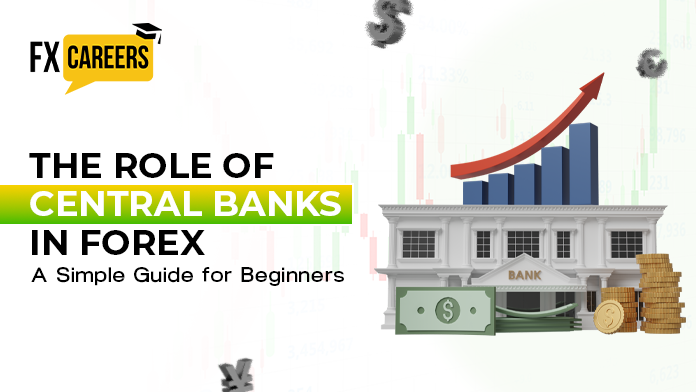FXCareers Blogs
 Go Back Home
Go Back Home
.png)
 20-08-2025
20-08-2025 5 minutes of Reading
5 minutes of Reading
Why is Forex Trading so difficult?
Forex Trading is seen as an easy means to become financially independent. You must be hearing stories of forex traders making quick money in the forex market where daily turnover is more than $7 trillion. But behind the success stories of forex traders lies a harsh reality that forex trading is extremely difficult for the majority of individuals as they lack proper Forex Trading Strategy, use unregulated Forex Trading Broker, have accounts on various Forex Trading Platforms instead of Best Forex Trading Platform and overlooking Risk Management.
In this blog, we are going to discuss
- Why is forex trading challenging?
- Which Forex Trading Strategy should forex traders use?
- Which Forex Trading Broker or Platform should forex traders use?
Whether you are a beginner or an experienced forex trader, knowing the following issues is the key to overcoming them
The Illusion of Simplicity
One of the largest errors that new forex traders commit is believing that trading in the forex market is simple because it is easy to register with a forex trading broker and access demo accounts provided by various forex trading platforms. Anyone can open an account with a forex trading broker, download forex trading systems, and start trading forex pairs by clicking buy or sell.
But profitable trading calls for a careful forex trading plan, psychological edge, market knowledge, and continuous adjustment.
Why is forex trading challenging?
1. Lack of Appropriate Education
These traders are unaware of the fundamentals like macroeconomics, interest rate policy and central bank behavior on which major forex pairs such as USDJPY are based. Most beginners in forex trading depend on random signals or YouTube strategies. But they must understand that without proper forex market education and customized forex trading strategies, the traders are essentially gambling.
What is the solution?
FX Careers, Forex Trading Institute in Dubai offers a Forex Trading course for all types of traders. Whether you are a beginner looking towards forex trading as a career opportunity or a professional trader looking to enhance forex trading strategies, FX Careers Dubai caters all your forex trading needs.
Which Forex Trading Strategy should forex traders use?
1. Trading Attitude and Emotions
The majority of forex traders lose money due to their emotions such as greed, fear, and impatience. These emotions make individuals :
- Close profitable trades too soon
- Keep losing trades for far too long
- Revenge trade following a loss
Professional traders use risk management and mechanical systems to prevent emotional trading whereas retail traders overlook this.
2. Market Manipulation
Unlike the stock market, the forex market is decentralized. There is no clearing corporation that oversees all trades. Price manipulation can be done by institutions and banks in a matter of seconds, producing fake breakouts or liquidity grabs.
This type of manipulation will most likely be traded by retail traders before the actual move. A forex trading strategy should consider manipulation areas and false breakouts.
3. Over Leveraging
Leverage is a double edged sword. All the forex trading brokers provide leverage of up to 1:500. Although this maximizes profit, it also maximizes loss. New traders over leverage and lose more than they can afford to lose.
Without a risk management plan (such as risking 1% per trade) even a good forex trading plan will collapse due to one bad day.
Which Forex Trading Broker or Platform should forex traders use?
1. Shifting Market Conditions
What is successful today might not be successful tomorrow. Strategies that succeed in trendy markets can collapse in sideways or range bound markets. For example:
- EURUSD is policy led when ECB or Fed policy varies
- XAUUSD trends with risk sentiment and inflation
- USDJPY responds sharply to BOJ yield curve control measures
It's the ability to alter your forex trading strategy when the circumstances change that separates the experts from beginners.
2. Changes in News and Surprising Events
Even with the best technical analysis, surprise news ( like economic data, geopolitical events) can destroy a winning trade. A winning trade can become a huge loss in a matter of seconds.
All of the forex trading platforms nowadays provide real time news, but if you are not ready with proper risk management, volatility will shake you out.
For example : A strong Non Farm Payroll report can cause huge swings in the USD for USDJPY, EURUSD, and XAUUSD.
3. Too Many Strategies, Not Enough Mastery
Most traders use numerous technical analysis indicators ( like RSI, MACD, Moving Averages, Super trend ), systems, and YouTube methods. They change their methods after every loss. They never stick to a method. They're constantly looking for a perfect solution.
The truth is, there is no perfect system. Good traders learn one or two systems and modify them based on their own personality and time situation.
The best tip is to choose a forex trading strategy that is compatible with your lifestyle such as trading USDJPY very rapidly on the 5 minute chart or trading XAUUSD over a few days.
4. Inefficient Broker Choice
Not all brokers are equal. Some brokerages for forex trading offer low spreads and quick execution, and others may delay orders, unfairly change spreads, or freeze platforms during times of market volatility.
Selecting the most suitable forex trading platform with regulated brokers, good customer support, and clear policies is crucial.
Warning Signs :
- Unregulated offshore brokers
- Over the top bonus plans
- Withdrawal delays
It is always recommended to check user reviews and regulation (e.g. FCA, ASIC, or CySEC) before depositing funds into an account.
5. Unrealistic Expectations
Many traders believe that forex trading will make them wealthy quickly. They hope to make steady profits every week, which is not realistic. This causes frustration, excessive trading, and eventually tiredness.
It is recommended to treat trading like a business. Have modest, realistic targets. Concentrate on process, not profit. To succeed in forex trading, forex traders should be consistent, patient and disciplined.
6. Lack of Risk Management Discipline
Most traders learn risk management in theory but do not practice it. For example, they increase lot size after they have won some trades or they do not respect stop losses because they believe the market will turn or reverse during adversities. This lack of discipline kills accounts in the long term.
- Always use fixed stop loss and take profit levels.
- Only risk a small fixed proportion (1–2%) of your account on any trade.
- Never let one trade decide your profession as a trader.
7. Ignoring Higher Time Frames
Beginners tend to use 1 minute or 5 minute charts, assuming smaller timeframes will yield quicker profits. Without reviewing higher timeframes (Daily, Weekly), they overlook the bigger market trend and unknowingly counter it.
A forex strategy must always start off with considering the big picture.
- Weekly chart - Identify the main trend
- Intraday chart - Identify support and resistance levels
- Intraday chart - Identify correct entries
8. Over Trading and Lack of Patience
Most traders feel they need to be in a trade every moment. Overtrading occurs when traders are trading in sideways markets or going after setups that are not in their plan.
Overtrading results in
- Increased transaction costs (commissions, price differentials)
- Bad setups leading to low win rate
- Mental exhaustion
The best traders understand that knowing when not to trade is as important as knowing when to trade.
9. Ignoring the Power of Journalising
If traders do not record their trades, they cannot find patterns in their mistakes and strengths. Many retail traders keep making the same mistakes because they do not look back at their trades.
Maintain a trading journal containing:
- Entry & exit points
- Reason for trading
- Market situation (event, news, trend)
- Emotional condition
This self reflection is usually the difference between a losing trader and a consistently profitable trader.
10. Lack of Continuous Learning
The forex market is dynamic. Central bank policies, world economies and trading tools are changing continuously. Those who stop learning will eventually be left behind.
Continuous learning means :-
- Examine macroeconomic trends (interest rates, inflation)
- Testing new trading strategies.
In forex trading, the day you stop learning is the day your strategy becomes outdated.
What You Can Do Instead?
If you genuinely wish to earn money, here is a plan:
1. Select a Forex trading broker who is licensed
Select a regulated, transparent broker that provides you with access to all the major currencies such as EURUSD, XAUUSD, and USDJPY.
2. Select the Best Forex Trading Platform
Select platforms like MetaTrader 4/5 or TradingView with advanced charting and order management.
3. Develop a Personalized Forex Trading Strategy
Practice testing your strategies to confirm that they are compatible with your trading style and available time. Use technical indicators with major news.
4. Focus on Risk anagement
Never risk more than 1–2% on any trade. Employ stop-losses. Don't be overleveraged.
5. Journal and Review Trades
Track each trade, your bias, logic, and result. This will make you sharper.
Frequently Asked Questions (FAQs)
1. Why do most forex traders lose money?
They emotionally trade, poorly risk-manage, and fail to stick to a standard forex trading strategy.
2. Is forex trading a full-time profession?
Yes, but following years of unrelenting practice, capital accumulation, and mental discipline.
3. What is the best forex online trading platform for beginners?
MetaTrader 4 and TradingView are easy to use and strong options.
4. How do I choose a suitable forex trading broker?
Look for regulation (ASIC, FCA), platform quality, satisfactory spreads, and client reviews.
5. Do you need to employ indicators when trading?
Not always. Many traders only use price action, but tools like RSI, MACD, or moving averages can help make better decisions.




